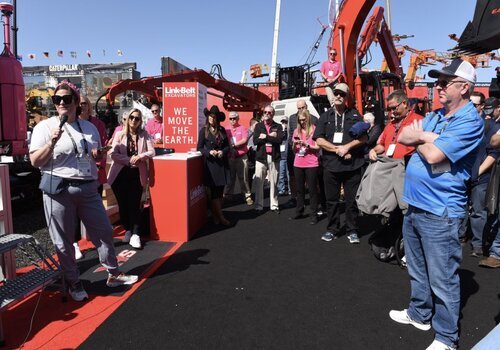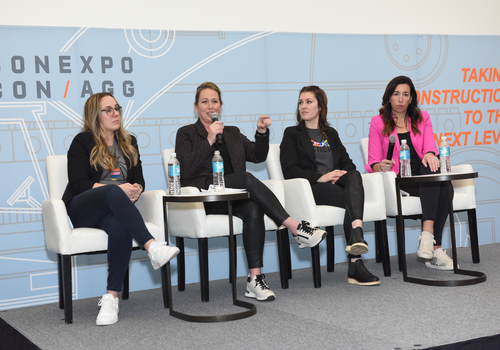If you are in a mental health crisis, call or text 988 to speak to a crisis counselor now. You can also text HOME to 741741 to reach the Crisis Text Line and speak to a live, trained crisis counselor. Learn more about the Suicide & Crisis Lifeline 988.
The construction industry, known for its rigorous physical demands, has long grappled with a less visible but equally challenging issue: mental wellness. The impact of mental wellness on workers in this sector can no longer be underestimated, given the high rates of stress, depression, substance abuse and suicide. Leaders within the industry must play a critical role in changing the current landscape, ensuring their workers' mental and physical wellness are given equal priority.
A poignant example comes from Barry L. Schlouch, co-founder of Schlouch Incorporated. Barry and his wife Deb started the company in 1983 in the basement of their home while parents of a 4-year-old and a 1-year-old. That first year, they started with just $2,000. Fast forward 41 years and the company has collectively done about $1.8 billion in business.
From the outside, Barry seems to have it all. But inside was a different story. Barry grew up on a farm where he and his brother learned the value of a hard day’s work from his grandparents. He remembers those days fondly, saying “I don’t know where we would be” without his grandparents’ influence. But Barry’s parents struggled with substance abuse issues his entire childhood. While Barry went on to start a thriving company and be a good husband and father, he acknowledges that he was not doing as great of a job as he wanted, carrying anger inside him.
When Barry was 32, his mother finally started getting the help she needed. After finding his mother, who he was ready to give up on, nearly dead from over-drinking, Barry dropped her off at a detox center at a local hospital that one of his superintendents recommended. Barry recalls saying, “She’s all yours,” and not intending to go back.
But to visit his mother, he needed to enter the co-dependency program for family members at Caron Treatment Centers so Barry and his wife, Deb said yes and started a journey that would change not only his life, but the lives of his family and his employees. “It opened up this whole world I didn't know that existed on how to get well.”
A few years later, Barry’s son was having some issues that required a psychologist. So, they took him to a center that was a two-hour drive each way to Baltimore. It was at that treatment center where Barry learned even more tools to deal with his own mental wellness journey. The counselor asked Barry to drive up every Saturday to improve his parenting skills and learn how to ask his son and daughter how they were feeling and doing. “I didn't even know to ask something like that.” Barry recalls. “When I grew up, nobody asked me how I felt.”
It was at these sessions where Barry was finally able to acknowledge the pain of his childhood and discover that talking about it was the first step in his wellness journey. “It turned out that the adversary is what brought the healing to us,” he said.
In 1995, three years into his wellness journey, Barry realized that he didn’t like his own company which had a lot of men who did a lot of unnecessary yelling. “I don’t fit into what I created,” he said, so he asked his counselor for help.
Barry and Deb’s counselor, a man who Barry describes looking like Albert Einstein, came over to visit his company and said he could help transform the culture. “I can help you,” Barry recalls his counselor saying.
The counselor had three conditions. One, ALL employees must participate and get paid for doing so. Two, Barry must attend every group meeting so the employees would trust him. Three, the meetings must occur in a “home-like” environment. Barry built out rooms with sofas to create comfortable areas for small groups of 4 to 25 employees to meet.
Inside those rooms, they started with just talking, allowing a safe place for the groups of mostly men to talk about things they were not used to talking about. The goal was to build “care and trust” to show how communicating can solve problems. “It was amazing,” Barry said.
During that first year, Barry said that he stayed committed to helping his employees with their mental wellness journey and to creating a company that he felt proud of owning. But it wasn’t without its roadblocks. About 70 percent of the top team members left in the first year of the program. These men were not willing to participate in the wellness sessions, which were required as part of the work. Barry stayed the course, even though he said it was challenging as the people who left were “pretty darn talented” and “made him a lot of money.” But if they wouldn’t participate, Barry knew he couldn’t keep them. “It was tough,” he said of that first year.
But Barry found that others in the company who had stayed were more than willing and capable of moving up into the higher roles. “They were talented, they were competent and they really wanted to be a part of this,” he said. “So, I was impressed. I wasn't impressed when I was losing everybody -- but I was impressed how fast people rose up to the challenge.”
It took about 5 years to fully change the company culture. Barry found that about one-third of the employees were against the change, one-third were on the fence and one-third were ready from the start.
In 2000, Schlouch Incorporated was recognized as the “#1 best place to work in Pennsylvania for large companies” (over 250 employees’ category) beating out larger companies like Hersey’s and Harley Davidson. This recognition is based mostly from employee feedback. It was the first time a construction company had ever taken this top honor. Barry credits the mental wellness commitment as the catalyst changing the company.
Today, Barry said he can’t think of another company where all the employees take part in mental wellness every single day and where all 275 workers fit into the company culture.
To leaders who feel like they don’t have the time or resources to start their own programs, what's the value of a person's life?
Barry L. Schlouch
Co-Founder, Schlouch Incorporated
Barry shared the profound impact that his own mental wellness has had on both his personal and professional life – and how one decision in 1989 changed not only his life but countless others.
"Mental wellness is the foundation for success,” Barry says. “Because when you think about it, we have the physical body, we have the emotional, and we have the mental; and the mental will heavily influence the emotional and the physical."
Implementing Supportive Practices
By discussing his own challenges and how mental wellness has influenced his life, Barry created a culture of openness at this company. Today, he encourages his team to share their feelings, opportunities, and challenges for 15-minutes when they start the day during the required morning safety huddles. This is an opportunity for Barry to know that each of their employees has had someone check on them at least once a day, which seems simple but often doesn’t happen in the construction industry. Adding a mental wellness discussion to existing morning safety talks is something every leader can start today.
Other methods Barry uses to check the pulse of the workforce is to have groups of three get together for a Q&A session where the workers can answer openly and honestly in a more private environment. “When they go in groups, they kind of check in with each other,” Barry says. “They collectively compare what's on their mind. And then they come up with a question. It's beautiful.” I do my best to personally attend at least one safety huddle each week to check on our team and answer their questions.
Simple but consistent initiatives can significantly impact the mental health of construction workers. For example, Barry’s approach involves regular check-ins with employees, recognizing significant milestones with a public announcement that someone has advanced or has a work anniversary, birthdays with hand painted cards from his wife, cakes for work anniversaries, and even personal gestures such as visiting workers undergoing medical treatments, sending flowers and cards. These actions, simple yet profound, help in building a supportive workplace culture.
Barry discusses the importance of systemizing these practices. The establishment of HR systems that ensure personal acknowledgment foster a sense of belonging and appreciation. Such measures, although small, contribute to a larger atmosphere of care and support within the company. “The whole key is being consistent,” Barry says. “This care is not a one-time thing. Trust is not a one-time thing.”
Leaders Must be Proactive
Barry’s journey highlights a vital message: mental wellness needs to be a priority in the construction industry. It’s not just about improving productivity but about genuinely caring for the workforce that builds our world. Leaders must take a proactive approach, advocating for and implementing practices that support mental wellness. The future of the industry depends on its ability to evolve, ensuring that its workers are healthy in mind as well as body.
One of the most significant steps a leader can take is to create a safe space for employees to express their concerns and struggles, as Barry has done. Peer support programs, where workers can share experiences and coping strategies, can help in creating a community that looks out for one another. These programs can also play a pivotal role in reducing the stigma associated with mental health issues, making them less daunting for those affected.
As the construction industry continues to confront these challenges, the hope is that more leaders will emerge, inspired by stories like Barry’s, to champion mental wellness and save lives in the industry from the ground up.
To leaders who feel like they don’t have the time or resources to start their own programs, Barry asks, “What's the value of a person's life?”
Learn More
Schlouch Incorporated posts videos on YouTube about mental wellness and celebrating workers. Leaders can watch these videos for ideas and use it to start their own mental wellness programs, including a video for leaders about mental health.
Content Notes: The CONEXPO-CON/AGG 365 newsletter will feature content about mental health over the course of the next few months. While these topics can be challenging, we want to remind you about one underlying feature: hope.
We will tackle topics related to suicide, PTSD and other mental health conditions that are prevalent in the construction industry. There are resources to help – whether you need help yourself or want to help a friend. Where there is help, there is hope.
One way to attack the mental health stigma is by telling your story. Please contact us if you would like to share your journey with fellow CONEXPO-CON/AGG 365 readers.
Another way to help is to share this story on your social media or with someone who may benefit from hearing about mental wellness in the construction industry.
Photos courtesy of Schlouch Incorporated.












